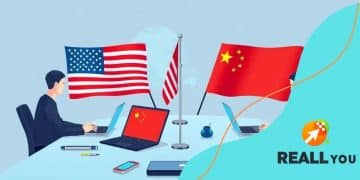S&P 500 reacts to tariffs: what you need to know

Anúncios
The S&P 500 reacts to tariffs by experiencing price fluctuations, influencing market performance based on changes in trade policies, impacting different sectors and requiring investors to adapt their strategies accordingly.
S&P 500 reacts to tariffs, and these shifts can leave investors wondering how to adjust their strategies. With global trade dynamics continually evolving, understanding these reactions isn’t just informative—it’s essential for your financial well-being.
Anúncios
Understanding the S&P 500 and its significance
Understanding the S&P 500 is crucial for any investor. This index represents the performance of 500 large companies listed on stock exchanges in the United States. It’s often seen as a benchmark for overall market performance.
Anúncios
What Makes Up the S&P 500?
The S&P 500 includes companies from various sectors, which makes it a diverse group. This diversity helps in assessing the economy’s health. Some of the sectors represented are:
- Technology
- Healthcare
- Finance
- Consumer Goods
Each company is weighted by its market capitalization, meaning larger companies have a more significant impact on the index’s performance. Many investors view the S&P 500 as a barometer for economic conditions.
Why is the S&P 500 Significant?
The significance of the S&P 500 lies in its ability to provide insights into the market trends. Investors often use it to gauge the performance of their portfolios. Tracking the index helps in making informed decisions in the face of market changes.
Moreover, the S&P 500 is a popular choice for mutual funds and ETFs, which allows investors to gain exposure to the broader market. Many people consider investing in an S&P 500 index fund as a relatively safer option. This is mainly because it spreads the investment across many stocks, reducing individual stock risk.
In summary, the S&P 500 serves as a key indicator of market health and performance, making it vital for investors to understand and monitor.
How tariffs influence market behavior

Tariffs play a significant role in shaping market behavior. When a country imposes tariffs, it affects the prices of imported goods, leading to various reactions in the market. Understanding how tariffs influence the economy is essential for both investors and consumers.
Immediate Effects of Tariffs
One of the first things that happens when tariffs are introduced is the increase in prices for imported products. As foreign goods become more expensive, consumers might turn to domestically produced alternatives. This shift can benefit local manufacturers but may also lead to higher prices overall.
- Increased consumer prices
- Shift in demand towards local products
- Potential job creation in domestic industries
However, the repercussions extend beyond just prices. Businesses that rely on imported materials might see their production costs rise, causing them to rethink their supply chains. This can lead to delays in production and changes in business strategies.
Long-Term Market Impact
Over time, tariffs can significantly alter market dynamics. For instance, prolonged tariffs can lead to trade tensions that affect investor confidence. When businesses are uncertain about future trade policies, they may delay investments or scale back their operations.
In addition, tariffs can trigger retaliatory measures from other countries, leading to a trade war. During such times, markets can become volatile, making it difficult for investors to predict trends. Understanding these effects helps investors navigate uncertain waters.
Moreover, while tariffs might aim to protect certain sectors, they can harm others. For example, industries that rely on exports might suffer from reduced market access, impacting their revenue and growth potential.
Recent trends in tariffs and the S&P 500
Recent trends in tariffs have significantly impacted the S&P 500. As countries adjust their trade policies, investors need to pay close attention to these changes. Understanding how tariffs influence the market helps in making informed decisions.
Current Tariff Developments
Tariff changes occur frequently based on political and economic needs. For example, recent discussions about tariffs on steel and aluminum have led to fluctuating prices in related sectors. Investors should watch for announcements that could influence the overall stability of the S&P 500.
- Increase in tariffs on imports
- Trade negotiations impacting manufacturing
- Shifts in consumer behavior due to price changes
As tariffs rise, many companies within the S&P 500 react by adjusting their pricing strategies or sourcing materials domestically. This can create short-term volatility but also opportunities for growth in certain industries.
Market Reactions to Tariff Changes
When news of new tariffs breaks, we often see immediate reactions in the stock market. Investors may sell off stocks of companies most affected by the changes, leading to a decline in the S&P 500. The market tends to stabilize as investors reassess their positions.
In the long run, however, some companies adapt by innovating or exploring new markets. The S&P 500 often recovers as businesses find ways to thrive despite tariffs. Watching how the index responds to ongoing trade discussions can provide insights into future trends.
In conclusion, staying informed about recent trends in tariffs and their effects on the S&P 500 is essential for investors. These factors directly influence market dynamics and can lead to both risks and opportunities.
Strategies for investors during tariff changes

During times of tariff changes, investors must adapt their strategies to navigate the uncertain landscape. The impact of tariffs on the S&P 500 can create both risks and opportunities. By staying informed and flexible, investors can better manage their portfolios.
Risk Assessment
The first step for investors is to assess the potential risks associated with new tariffs. This includes analyzing how specific sectors may be affected. For example, industries reliant on imported materials might face increased costs, which can impact their profitability.
- Evaluate exposure to affected industries
- Monitor product pricing trends
- Consider regional impacts of tariffs
Investors should also keep an eye on how competitors are responding to tariffs. Companies that adapt quickly and effectively may emerge stronger.
Diversification of Holdings
Another strategy is diversification. By spreading investments across various sectors, investors can mitigate risk. If one sector suffers because of tariffs, other sectors may perform well, balancing the overall portfolio.
Consider including companies that may benefit from tariffs, such as local manufacturers. These businesses might experience increased sales as consumers shift away from higher-priced imports.
Staying informed about policy discussions and anticipating changes can help investors make smarter decisions. Opportunities may arise even when conditions seem dire. Investors should look for stocks that are undervalued or have strong growth potential despite tariff volatility.
Understanding the broader economic context is equally important. Tracking inflation rates, interest rates, and consumer sentiment can provide insights into how tariff changes might evolve and influence market performance.
Future outlook for the S&P 500 and tariffs
The future outlook for the S&P 500 amid tariff changes remains uncertain but intriguing. As global trade policies continue to evolve, investors must stay informed about potential impacts on the index. Understanding how these factors interact can help in making better investment decisions.
Impact of Ongoing Tariff Policies
Tariff policies can shift rapidly, influenced by political decisions and economic needs. As such, the future of the S&P 500 could hinge on whether countries choose to escalate or resolve trade tensions. A decrease in tariffs may lead to increased trade and economic growth, thus potentially boosting stock prices.
- Monitor legislative discussions surrounding tariffs
- Track indices related to trade agreements
- Evaluate economic forecasts from financial analysts
On the other hand, if tariffs remain high or increase, we might see a contraction in certain sectors, ultimately affecting S&P 500 performance. Companies facing higher production costs may struggle, leading to reduced profits.
Investor Strategies Moving Forward
In light of these uncertainties, investors should adopt flexible strategies. Keeping a diversified portfolio helps hedge against sector-specific downturns. Investing in sectors that thrive during tariff implementations, like local manufacturers, could also prove beneficial.
The S&P 500 may reflect broader economic conditions driven by consumer confidence and international trade. A strong domestic market may offset some negative impacts from tariffs, while a weak market might heighten volatility.
Overall, investors must be proactive, keeping an eye on how tariff-related news influences market dynamics. The ability to adjust portfolios based on market signals will be crucial for future success.
FAQ – Frequently Asked Questions About S&P 500 and Tariffs
How do tariffs affect the S&P 500?
Tariffs can increase costs for companies, leading to lower profits and potential declines in stock prices within the S&P 500.
What should investors do during tariff changes?
Investors should monitor news, assess risks, and consider diversifying their portfolios to protect against sector-specific downturns.
Are there specific sectors that benefit from tariffs?
Yes, domestic manufacturers may benefit from tariffs as consumers shift away from more expensive imported goods.
Why is it important to stay informed about tariff policies?
Staying informed helps investors make timely decisions and adjust their strategies based on the latest policy changes and market reactions.







